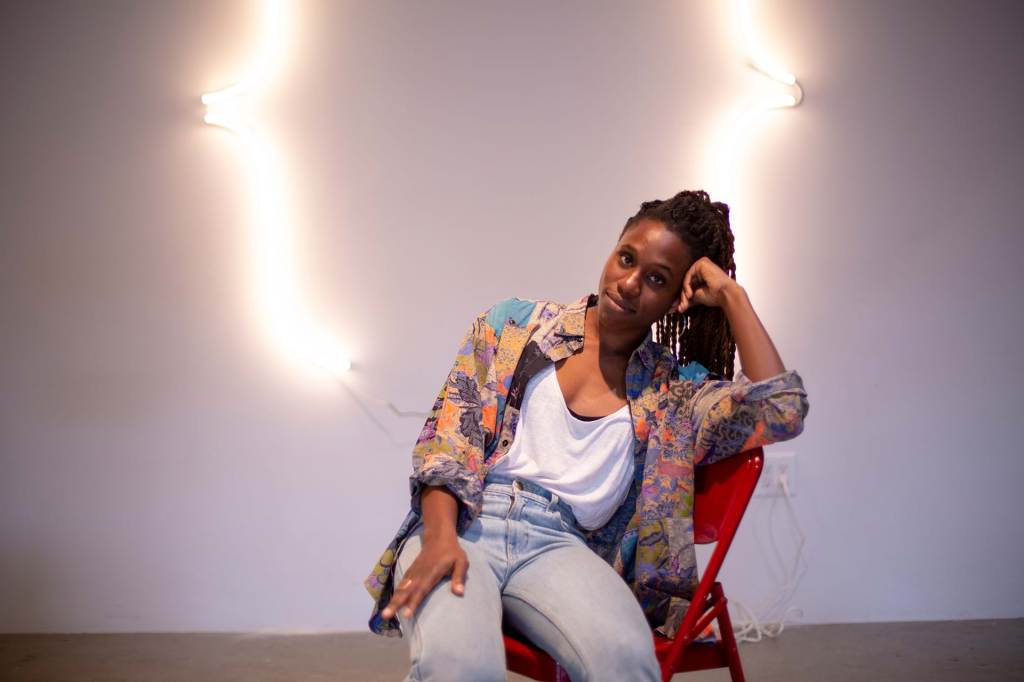
Mimi Onuoha, 29, is a Brooklyn-based mixed media artist, programmer, writer, and researcher who explores missing data, AI-based technologies and the ways people are abstracted, represented, and classified by socio-technical systems. Here she sheds some light on how her career path unfolded.
Ford Foundation: What issues keep you up at night?
Mimi Onuoha: I often find myself thinking about what happens to people who don’t fit into the system, seeing myself as one of those people. I’m interested in what it means to be classified in different ways, and what it feels like when life-altering decisions are mediated by machines.
Where does power actually lie when it comes to automated decision making systems, or just automated systems? I think about how computational structures are maintained, not just how they’re created, but how they stay, how they linger and how they’re undermined or reinforced by social ones, and what happens when those two things meet.
Some of the work I’ve done is around missing data sets, which are these blank holes in otherwise data-saturated systems. The one that really got me into this was citizen surveillance held by the police, which no longer is a missing data set.
Some of the things that are missing are quite serious, like sexual assault and harassment. And then there are things that are more frivolous, like weather data we don’t have. What I find interesting is why they exist and what they say about art in general, or about structures for making sense of the world.
Which comes down to making it into data: seeing that as a process, and seeing how groups can have conflicting relationships with what it means to be represented in data sets, and not to be.
Your journey, and the issues you work on, have been grounded in what technology can or cannot do. Do you identify first and foremost as an artist? A technologist?
As an artist, but only because it seems to be the term that allows me the most latitude. If you’re like, “I’m an artist and teacher and educator and programmer and this and that,” I think there’s diminishing returns. Then everyone’s like, “You don’t do anything.” So I keep it simple.
How did you turn all of this into a career?
When I went to college I majored in anthropology, but it was always with a focus on media and technology. I was interested in the technical platforms that were influencing our lives and specifically how we express culture or rituals.
What advice would you give to your younger self—what do you wish you’d known?
Document everything you do because you just don’t know what will be useful later on. Write down everything. Take photos of everything. Try to get healthcare. It’s good to have that. Steady paychecks are really good.
I feel like a hybrid—moving between spaces can be cool because it allows you to see structures more easily, but you also have to deal with this constant sense of losing out on something. By focusing on one thing, you’re neglecting all the other things you could be doing. I would give my past self permission to just be worried: That’s okay, the uncertainty is fine. It doesn’t go away. You just get better at managing it and things don’t all have to make sense.
The hard work is dealing with uncertainty. Finishing a project and thinking, “Now what?” Working through that difficulty. That’s just part of it.
What is the most exciting thing about the growth of public interest technology?
To me, it’s that this is a thing that has a name. It’s defined. I guess the worry is that we’ll only care about social issues as long as they intersect with technical ones, and we’ll only care about technical concepts as long as they intersect with public interests. There’s this natural tension once you do define something—you define what it isn’t, as well.
Mimi is one of the Public Interest Tech voices we’ll be hearing from as part of this series over the next few weeks. Join us as we speak to thought leaders and discover their unique paths.
